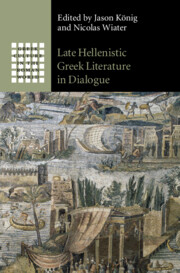Book contents
- Late Hellenistic Greek Literature in Dialogue
- Greek Culture in the Roman World
- Late Hellenistic Greek Literature in Dialogue
- Copyright page
- Contents
- Figure
- Contributors
- Preface
- Abbreviations
- Introduction
- Chapter 1 The Empire Becomes a Body
- Chapter 2 Pyrenaean Mountains and Deep-Valleyed Alps
- Chapter 3 Sailing the Sea, Sailing an Image
- Chapter 4 Ecocritical Readings in Late Hellenistic Literature
- Chapter 5 Civic and Counter-Civic Cosmopolitanism
- Chapter 6 The Wrath of the Sibyl
- Chapter 7 Imagining Belonging
- Chapter 8 Philosophical Self-Definition in Strabo’s Geography
- Chapter 9 Narrating ‘the Swarm of Possibilities’
- Chapter 10 ‘Asianist’ Style in Hellenistic Oratory and Philostratus’ Lives of the Sophists
- Chapter 11 Greek Reading Lists from Dionysius to Dio
- Chapter 12 Envoi
- References
- Index Locorum
- General Index
Chapter 6 - The Wrath of the Sibyl
Homeric Reception and Contested Identities in the Sibylline Oracles 3
Published online by Cambridge University Press: 21 April 2022
- Late Hellenistic Greek Literature in Dialogue
- Greek Culture in the Roman World
- Late Hellenistic Greek Literature in Dialogue
- Copyright page
- Contents
- Figure
- Contributors
- Preface
- Abbreviations
- Introduction
- Chapter 1 The Empire Becomes a Body
- Chapter 2 Pyrenaean Mountains and Deep-Valleyed Alps
- Chapter 3 Sailing the Sea, Sailing an Image
- Chapter 4 Ecocritical Readings in Late Hellenistic Literature
- Chapter 5 Civic and Counter-Civic Cosmopolitanism
- Chapter 6 The Wrath of the Sibyl
- Chapter 7 Imagining Belonging
- Chapter 8 Philosophical Self-Definition in Strabo’s Geography
- Chapter 9 Narrating ‘the Swarm of Possibilities’
- Chapter 10 ‘Asianist’ Style in Hellenistic Oratory and Philostratus’ Lives of the Sophists
- Chapter 11 Greek Reading Lists from Dionysius to Dio
- Chapter 12 Envoi
- References
- Index Locorum
- General Index
Summary
This chapter examines the culture of Homeric reception in the late Hellenistic period through the vehicle of one fascinating, important and under-considered text: the third Sibylline Oracle – a largely Jewish work which contains a fiery attack against Homer, where the Sibyl accuses him of lying about the Trojan war and stealing her verses and metre. After setting this passage in the wider context of local and cosmopolitan traditions concerning both the Sibyl and Homer’s constructed identities, I then use close reading to argue that the critique contained within the Sibyl’s anti-Homeric rant (much more sustained, erudite and witty than the scholarship has previously allowed) has much in common with both Hellenistic and imperial modes of Homeric response: it blends elements familiar from earlier Alexandrian exegesis and later Second Sophistic revisionism. Read in this way, the passage stands as a remarkable witness to the shared concerns and reading practices across different ‘periods’ (Hellenistic and imperial), genres (poetry and prose) and religious cultures (pagan and Jewish) during this pivotal time.
Keywords
- Type
- Chapter
- Information
- Late Hellenistic Greek Literature in Dialogue , pp. 178 - 210Publisher: Cambridge University PressPrint publication year: 2022

